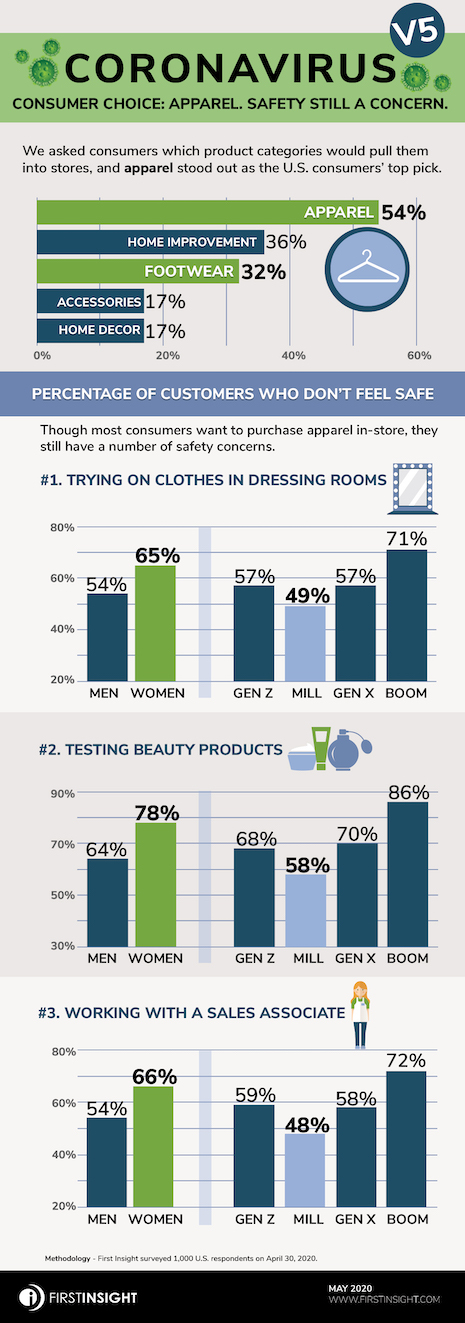As retail stores reopen in the United States exiting COVID-19 lockdowns, shoppers claim they are ready to buy apparel but do not feel safe trying the garments on over health concerns.
A new study from First Insight found that 54 percent of shoppers are ready to buy apparel in-store, followed by home improvement (36 percent) and footwear (32 percent). But the purchase experience will likely look much different from pre-COVID-19, with 65 percent of women saying they will not feel safe trying on clothes in dressing rooms, 78 percent would not feel safe testing beauty products and 66 percent would not feel safe working with a sales associate.
“While many shoppers seem ready to go back in-store, particularly to buy clothing, the experience is anything but business-as-usual,” said Greg Petro, CEO of Pittsburgh-based First Insight, in a statement. “The coronavirus has moved the industry away from high-touch to low-touch.”
By contrast to women’s concerns, 54 percent of men said they would not feel safe trying on clothes in dressing rooms, 64 percent would not feel safe testing beauty products and 54 percent would not be comfortable working with a sales associate. Clearly, men have fewer safety concerns in-store than women.
First Insight has a digital product testing and decision-making platform. The new findings were revealed as part of First Insight’s ongoing series of consumer sentiment studies entitled, “The Impact of Coronavirus on Consumer Purchase Decisions and Behaviors.”
 Apparel safety still a concern for in-store shoppers over COVID-19 coronavirus infection. Source: First Insight
Apparel safety still a concern for in-store shoppers over COVID-19 coronavirus infection. Source: First Insight
Millennials feel safest re-entering in-store environment
Per First Insight’s study, of the living generations, millennials feel the safest returning to the shopping environment overall.
Only 49 percent of millennials surveyed said they would not feel safe trying on clothes in dressing rooms, compared to 71 percent of baby boomers.
Likewise, 58 percent of millennials would not feel safe testing beauty products compared to 86 percent of boomers. Forty-eight percent of millennials would not feel safe working with a sales associate, versus 72 percent of boomers.
Millennials, it would seem, are more confident of resisting the coronavirus compared to the older, more vulnerable boomer generation.
 Greg Petro is CEO of First Insight
Greg Petro is CEO of First Insight
What will make consumers feel safe in-store
Respondents felt that hand sanitizer and limiting the amount of people in-store (80 percent in both cases) and wearing a face mask (79 percent) would make them feel safest.
Temperature checks (69 percent), self-checkout (69 percent) and farther distances between product racks or shelving (68 percent) ranked less important to consumers when considering safety of shopping experiences in-store, per the study.
COVID-19 worry and spending cutbacks subsiding slightly
The worry over the COVID-19 coronavirus is subsiding slightly, with 76 percent of respondents being worried on April 30, versus 82 percent on April 20.
The percentage of consumers cutting back on spending due to COVID-19 decreased, with 58 percent of respondents reporting cutbacks in spending on April 30 compared to 62 percent on April 20.
“The new normal for retailers will be to work with shoppers in a hands-free way to help them to find what they need while also giving them the space to feel comfortable, particularly with high-risk groups like baby boomers,” Mr. Petro said in a statement.
“Not feeling safe trying on clothing also begs many questions on how retailers and brands will need to adapt their return and exchange policy in the coming weeks.”
{"ct":"PWpPS06cOPDVpdVdTIQU9meFg\/tWRITAEYDoWzoBe+ZFvjCTbvgLYba0Xj6opz9DrajW1lnKTpxxAm01P6sDy8VwzR+TPZ5BTl3qnOVRV9FMlXqt6d\/1bsqt3TScHEvvo\/0bV0tNgTZCTXL32Gt2ndbRLRIVy3MTubv1rhA733kbNph9CXd2EMjM+38i1FOXbmuIlgT4NsikrHEe79N\/nQpCg9VvEpBc7jRmPrIj6pwkqIO0FYifGIIemqjthvUH0AMR9q5gvSfHnZfDGnjR0oQCmxDOnFTHPAEg1l2Zj8kmiVVp\/PRke2Z3pvcgvPTX44SYF2XHA1DJsizKIeSYlInlvjY0sYsnrhiSFyh\/K40uXAvVItfXqSzArIFhjU86o\/gJWYT70qM36rT4pWLEDJPe2J\/Uvjfhsu4WBQ8oMbsMQQ7UM0gvBE5JI\/b3qwBgSBrsSXK48hN2QwGXWKNmChfIBAEesKgtaCo+5Tx3p913IvD1rdmi1vtH4xAQkZmxr8WfmY0oZQIHvvPmSuDawoQYTry8iyBpqjBOl\/sbACFvPJ+slfeodkalgWaJdDpheo4jvsq9b6jxxKYIvusXkAm490w1Lra\/h7gn89lvn7cC5VP07jtdDr6KebrvprQgUeq9HdUatVLMe\/TnAZeXKMYIUDCMRfotmnHZc3S61McAo9pn77WLfd5L21WJkiZQR8Jv8CrElbzWYlj0fWpOWNlnHk\/4QMgNJSyP+zyKgvdwSMfs89g5MPJFpLxAfSB9ypzmvAm9ABktMjhh7z7\/SB41bkRilmIMK11UOoF1bL+M1k12MCXa2ZpJXSR4koVdQSu+EGYcudG4wpYI0B5fTn\/lpSHKco2n4fGT6CISP+Z1aAdU2X7JH\/LaUp17ce\/3VMsGmATrMp\/odCvA\/jx5utWwKrz4By+ES\/2E950h9WAQgzYLS1jgSd0W8Ks\/SwRRvDoW4KNEHZkRQbXoYQOGHx8pZEOco8+Y9+lcekrwWlzVx5S7NBxuR5oiYkRO\/I\/Ngk8l5jsBKe5pEswpNu1vKnXKPfNZdgeIgASfyTggg1nyp6xIjbJtuL+oqYsXg1vJYaFp9lNz8CMJBQvhpmb0Pf4PPLJPm6L14fcIW3fdoGQWdOI\/GqGdq1n\/+DKGMqKM\/map3Pl0+ozJyewhzGEDwc4tJiIiK1zieLLDc5Ka9mPFBE8AUPIrkep0ClFK97oK6poN0jeXFa00qnnU2O1m9Pqt\/K4BPRsyuvzRIZVs3SgJee7hACPE0fHWQPuOaByNkkENcM8zHHDfhV6UN61lngQfMIV8DnNgj2lUhqctbf+BxJGkkvi\/nKmM5qFCpX4WUs9j\/4jxFokiaPcd821J+UJxqtruYH3\/5WhNS4W9PLpIid\/2M2Cdb43x\/vQKrz8WHJSDEJEfvYKa1eCwjoYinBkg7KzIM91JR2cO0tpF5gLoz4UMZjyyN2S3SUB9KH\/6XGnY2ZpOFgxAqJXx7ygwM6MMmlBKuqKYePFvhqqJtawrX\/8XIQQnueVD\/0Cn9jAeDL1lawQdRl2ey8gs1caSRutWeNhmZ+Z43SQDwSVjwa6Y446\/jIu2Gq9\/U721xbtHaJ\/c\/jNiIkaPmXi6\/KHcPg5o6J3V9s3iolhksWgK8TWxAL4avw74QKlYbtxovoCPc7Ebxbricz8spV2E0OXKtesYUFlngn2OdRDNnoIIUjAJDAB07CY\/urB11bjfRlwMUQ+8Gyun8hTVTyIj52k7TClTpDfxSqFaD39zHP3N0DtBmznAq3LRSAnOE91IXUcuqc21YGLfjOF\/33uIFkBe2uHtJgLe4CfN5u9w2dAS\/0kuqZPU9lq84SDsOqwHjPWLKBIx4bCbuZyVAII0fUVn3Dil0Y+G3o1seugWIWVz5AXl4RiYvQsQAzT8nebQWcL+BojGtwh79fuN\/tPeMM1jAvI\/RtweX8iAmt811UMqU8DSy1wNYSbS7\/gLEagSsGOQswlseLAAAAoVmiLXerCZqaY6lwyUHY22FF1HFosw\/HeGFubsS1DCRtKla7JrVBJi2U2zJGutihAQPtl6y296J\/FdskCFljTLjvsKOg6\/gpeKGXzeIJrOoyxwfsbx\/o6nvaNZTDBoXF6nngy1xU6BmMeZ\/TczybWxtVO3v+aTskK8cJuJ3vl5ZpNZO\/2QfDFPdGHgFogsqDJmcXQihyaJTKOybtopDXEn5p7ww42yHoMJO6vmlt9VPR6vuYKnC3t1LPr2POz\/YgMtZ0z+lRjQjGeEEuLmjKuu0pgOfZdTAqiYHtCr6Ahym4uN09KctPaQd7DZuvp94HPIjC\/Byl5pH0g5tDjfXoorQQseIXc2tvDlUbbgUA+zZaETAK9DSbt0gpYDGZA1Rmut8Rtkv\/lbfMca0ytvW22REsK5B\/zDsBsl5hs9r0y3hqZ8Okx\/ItY9oGoGzeC0KQ\/KFTtiFypnQ+qEBFtjwhU5eyJG92dfcTZXTWPHc03MOk2wlP1MfK78XHbfz3aK4ZfqSC9bWc\/Si9UwuQ6hek1C0x8hax4hcPt1i\/QcVME7RmBv7x5IGUbhkeyHEtffgA+VmqzxY9efmvQniNHENWR4ICLtX4rKVgvLtdUZNLY8QDiJJOw+MtO+s5eUsDyfOvdri\/UYAxaPzDS8BK2yqvaqsQepu+alded7rmhuGBIMiUrLritUS+2Zwwkw8Tor7vWbhnbnwgA9\/pl2XMADSEavz2rrHhhkzQTwI22mBx5mmy5ag1k1x+Xwdy2ShaV6oG04H0veYYoDXP6kMf9FN3dG1E51O0AvWPEZM5DBnVkMq8kCoZhgsRoauUaE\/Njz18iCqsck1ibXY3dRPQ\/7ZEx86tg7HMhCtN4rba9WuqRlLdj9cC9ekUZ+wK9bFq3dRtMCxVAsQl93JtWeId0txV2X4b\/GLTyCQZOQ3OIoQgftbEJNEoMr2mBIJ6F55x\/okQf9C40nRDMcMx87PCESKbTNt00+X69pqmNROQOG93kaS+\/7qvHtMifA+zUnepYjoKFvOWKyzgxNbfMGl+E3OxOTYx+v+piNbxKT7TlsDG622DCv\/XFnsJxbdKqOpKpwp1O3qn8pCOlbc40ULvSyq\/gLj0GCza0ruXIB9Dj8GYh7FkI4KIo29SolIkKz51HNHVeoQEFehjZV1+3alIVon6f4wqho7fkHKlAIdwO9IlbW\/wgcbvJIGnAyUIdZzhRcmvAXIMIdt0h82dYPd\/IoBffFRuQWLZxHEliMEpWQcCIyJLm4xHDm7yTfaBEFWabVAKiz3VV9hQOajcFEZ++Qas9XGzJ1vzMYB\/jwBlOQoPbQ0qAozszAMlDqKnXVWshohtImNjSLAPkS9vd3LueQII1AYfRN4AsYK4MZ8HnFT6zMtbrSB6evSTR7eVFWtVlACVJ6taXw7GteeFSb5uCfhPplgSObDPj6pnZ60znDj8qOhlN2grnnTSByoPJ6DvWJgKQYaoHtNYh7oPMHaq7RxtoRHP8Zoj0lZZy3h7YEe7kbOVV0cseEOwJt+S1X\/e6wPXFlf4G+bJFoou5Y8Dm6fCt4iciMvi7X8oi2boXPyThIQmDlEuWHdN8gOjpMAMa1O3V+ajSY2fRoPDQM8jzj44NBOjGYJZ2u3lAP6M3vm0eI7HyPZCnPa6b+gjMVYhNNCFmJqodlMolK7pf\/KcHgpaDP+gbCBn9upsWniG6kZS620rkgWSGb9FEWtY6Zcgc7lBWPWwrRPfBEBpTvc74jV4y2iktYXENvbDCCMHtBb3Oi8WOJHd6ou2KJUuFrj7K6rKHko2bu2SpunA00VHWote57OmFfSLc6ZsmHpkIbpl0MeCN3zA+O4lUiVEp7GUIQ+YBpY\/4PkkfAOS5zbEO+39HDSc48FdGCgsFmTYUsQqR47l3w1gdoicO4k\/nq8an7PK03jsV+\/XPf3QWkvOzFHEKDkLVATu4uhGyOczeJZz\/sO2IzQnWuQB4lEPxAtat1f+hIC4xWp6N8kBNoO7JvcAD4b9OXYqBzMuH3+sejiPJrV1oHuVYrzlNrxLamU31GCcNWmCe8loIqbLmXC9NXGcdOJpxgnd9skUSnlLj3EEgICYFyeplI6lnkIBG4NtFpHjsnpQecXCqXsMBOPNUqhky8BePRQuRUZkll8LngyIuUdUdSoN3JoC0HGA1ra4AVyJ8+PmrBsvImPwJBJZ0+0+a+st1FMcFXOWMaOy1mTlppDzhU0pd5FvxN+AWYnaxGxQo79KqaUNJ7PYk5LVWTFsTt8WfyixQYP8aK\/nwOWRJH\/P79q+dnwp544A1gWJshuu4bu7W3GoWDt8aPbI8FTsxpBGizlaFnnYcfwqZ6d+tqzaDKZELQ0MbNd5CGN\/fSspuV3PmE46CoOQWW+LuVrfGrx59dG++7\/rxxRo9tgGSJEzgPqwNfpfvIJ4GS43DNfK1cR2CtfBfdg2xMUQmwKnHOCGZRIGf0gyNAi0W8ubocqf2gT1ZGOPdeCSki5bACr3dJKGvqLLlOUbjIy3MAHhpya\/VhFDR5hzKPKDS3gXswBDWTEzbpxhwAkjvFpdZX1OAInaaJmPAxlg9wDdCA8+XPMcSPvUlOO2vCLnO5n8QbrMJGXRvnanB0L1hmlVDvAfHQW5FrHnAkP2jK45g9b4cgZnk14loQyyUELqUWjvvhem6ps5HXSlwu3eUYqRIWNyHzEbgwyOlxzXjU6QJMr\/xnMcO+wC33HJf0v22vc58cev69VRfhziYtOAXRoffW0AX26Hv9rOzN5abh2YmBp0iHnTrouNR1nBsVfedbtMTo1y1o6eCocVqUYt4ix8872al9Bl8g5Sn0gyEMF11iBzJTryTP\/mdJBoFCQh\/8aPRVun6akkxjd6rDEcfBGKvMvAZMGMJLQN59ejmt\/RqN10ILAjDm0iNSkRGakekPU24mOFTlWfq4Yd0H2cv6\/FKy4ksotxKeEJ2gUblgcUuILn6SsLiT3hbqAq8bAP2qJ51uXqZabEaVSoUmDpJOD\/jIM4tddddaCibZk1Dk3fqWnLKcBX4QYEp6KlzP7yTsRGH\/Y5EnYI+WWKFzkXq2zqYeRcCDeMdVRPgkry8JFeVDB50UWPjImrkdxupqx7HkPrtlsrn3Xmo9n0taz+tBmq4kQE6S6nGFaktKKGGRGxx3drCsoTkClcU5ZIEV7j8Mu64Q6VeyqwitbC1uxXgPkhZ4\/3QHtjWGRUTOFsXpvDqEJpAbvMpqE2akD4hMww79rvihV47fy5UHKJMnJMxNSahKZXAkCzhvwoRv60a06XwQhL0Q82uB1dXyMCb3dWFfiE01ohzQMIS7CkvLkFytQgpdAizmtWGVjOTtzSJrlfd4RcCPEN4Sbm+P6ni5pJT1xgN1m\/yH6vrAnxxCwHGjy0mY6fmkfZw5TewqGz\/FcMheEWQQRwich4mdM7PaA\/4LKqsgkeW6Rfa7SETM9CCrTVYpaK0WCoHxMHbcZFlStg\/5O4F50c2+6mSuGmK1jYD+c6Ffd61srYlbWz+JPn2cWoCe63imLLuIVuruAFXZZmx3x+tIZ3fKVcxtlpxCLIbVfAxdVYnWXAnI\/CUw\/IoG\/c7cYVeGA6hKb40BTE0hFjJ7ASY3olMqspqT+HdD+N5avsOVHPaUz+xNfE86q8ytrEk9Ce3K9EnhL7Z\/OryvhqLEnwaXxnYhYAkD+ax3ndq+cbKRXEUvhL6sOZIma9WwRMAPnGGGjpEsUdyTmKSrDi9VSLxBnaJi\/xe+TA8T3pCqHijZ\/6fXYT2aJcAmv87RcOz\/lrt5pm3Y9XXveHd0MYS50o4+Gc7x7ix87ahubNWT8+9uCoBg2LrYVRTdv\/BSybbHRO4+l+F2VENqN+NqK3Wp4FHZUsc84lldGG+dI3S1G6nFy67c\/neYClOel2QcuQgCUlYHcDSmY67WPH6gF1b3jsz8HP0sWhW+8\/h0U32iBOsMCzMOpaeIzLRM2cpmHTG\/GibtEWComU76sjse18dg37fqX8ZMgAPdz3zX84dLZ8F8FfNjIoH9Y4tICuakRuNHjtgGZHe\/86zolYr6UZT2nt7\/6mh1dkwHYBzTPfDkuRYgXcPVXkeGjS\/MA9BBdsj1b\/nlqZFax+8Z47GQITghpqY3w4dr0jBssRrW7whxDzCumgTleL1XsngtwcdfWw7Ujz0UaTdkmfAHCYyO9sAqt1Rctc8DIzeFiFxxG6BcHK9MIfrAPvw2mvPvzNyeXYegn6xBTqwpYaSgPDANdgilGXrd\/Wz9+zjanqzbtIjanVJcCm6gILeY\/WNdC7+W4UCMx3Vi3Pr9aLeQvnviPKj9wpXR8cimE7LfOaA=","iv":"a76d6ccc9a70291b951ad88a01152564","s":"7ee3c81a454d86ce"}

 U.S. consumers are getting restless under lockdown, with millennials, men and those living in hot spots outside New York preferring to start going into retail stores by end of May. Image credit: First Insight
U.S. consumers are getting restless under lockdown, with millennials, men and those living in hot spots outside New York preferring to start going into retail stores by end of May. Image credit: First Insight
 Apparel safety still a concern for in-store shoppers over COVID-19 coronavirus infection. Source: First Insight
Apparel safety still a concern for in-store shoppers over COVID-19 coronavirus infection. Source: First Insight Greg Petro is CEO of First Insight
Greg Petro is CEO of First Insight